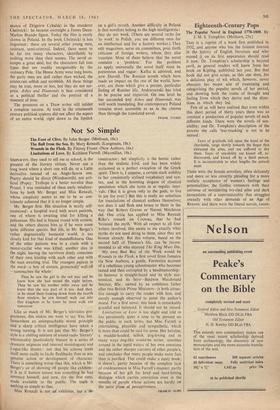Not So Simple
The Foot of Clive. By John Berger. (Methuen, I8s.)
SIMPLICITY, they used to tell me at school, is the greatest of the literary virtues. Never use a long word where a short one will do, or a Latin derivative instead of an Anglo-Saxon one. Poetry should be direct (Wordsworth), not arti- ficial (Pope): Trollope is a better novelist than Proust. I was reminded of these early misdirec- tions by both Mr. Berger and Miss Renault, whose simplicity seems to me to be so con- sciously achieved that it is no longer simple.
Mr. Berger first. His situation is neatly self- contained: a hospital ward with seven patients, one of whom is awaiting trial for killing a policeman. His bed is fenced round with screens, and the others discuss him as if he were some quite different species. But life, in Mr. Berger's rather dogmatically humanist world, is too closely knit for that kind of standoffishness. One of the other patients was in a crash with a motor-cyclist who was killed; another dies in the night, leaving the survivors dimly conscious of their own kinship with each other and with the man awaiting trial. The youngest patient in the ward—a boy of sixteen, protectedly well-off --summarises the whole:
Then he saw the girl in the red mac and he knew how she had mated the night before. Then he saw his mother miles away and he knew that she was part of it too. And then, as he stood there looking down from the fourth floor window, he saw himself walk out into that kingdom as he knew he must walk out tomorrow.
Like so much of Mr. Berger's television pro- grammes, this makes me want to say Yes, but. Somewhere an unimpeachable moral principle and a sharp critical intelligence have taken a wrong turning. It is not just that Mr. Berger's Style is a chilling mixture of sound-radio 'literary' Whimsicality (particularly blatant in a series of dramatic setpieces and internal moriologues) and Logue-like bluster: nor that his scheme lends itself more easily to facile flashbacks than to any genuine action or development of character. There is something worse than this, which is Mr. Berger's air of showing off people like exhibits; it is as if human nature was something he had invented himself, and now, for the first time, made available to the public. The truth is nothing so simple as that.
Miss Renault is not an' exhibitor, but a re- constructor: her simplicity is the heroic rather than the realistic kind, and has been widely acclaimed as a perfect evocation of the Greek spirit. There is, I suppose, a certain stark nobility in her consistently stylised vocabulary and syn- tax, and in the booming slogans of classical pessimism which she turns in at regular inter- vals. (glut it is given only to the gods, to live in joy for even') But this is really no substitute for translations of classical authors themselves; nor does it add flesh and bones to them in the way that Robert Graves or Naomi Mitchison did. One critic has applied to Miss Renault Rilke's remark on Cocteau, that he had 'bronzed the myth.' With all respect to all four writers involved, this seems to me exactly what myths do not need doing to them, since they are bronze already. But this volume, based on the second half of Theseus's life, can be recom- mended to all who enjoyed The King Must Die.
My own Best Buy of the Week would be Wounds in the Flesh, a first novel from Jamaica via New Authors, a gentle, Forsterian account of a rebellious young schoolmaster who becomes tamed and then corrupted by a headmastership: its humour is straight-faced and its style eco- nomical, and its hero—Baldwin Macdonald Sinclair, BSc., named by an ambitious father after two British Prime Ministers—is both attrac- tive enough to carry the reader with him, and sternly enough observed to point the author's moral. For a first novel, this book is remarkably graceful and balanced. It should not be missed.
Limitations of Love is too slight and told in too persistently quiet a tone to be pressed on the public in such terms, but Miss Farrell is entertaining, plausible and sympathetic, which is more than could be said for some. Her heroine, a muddle-headed, selfish, dog-loving and in many ways dog-like would-be writer, stumbles around in the tepid waters of her own emotions and the rather sharper currents of other people's, and concludes that many people make more fuss than is justified. This could make a nasty book; it doesn't, partly because of the complete lack of condescension in Miss Farrell's manner, partly because of her gift for brief and hard-hitting dialogue which carries conviction even in the mouths of people whose actions are hardly on the same plane of perceptiveness.
FRANCIS HOPE


































 Previous page
Previous page